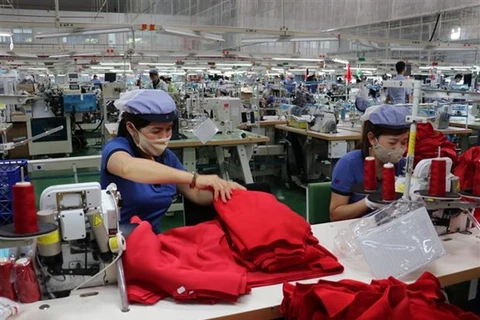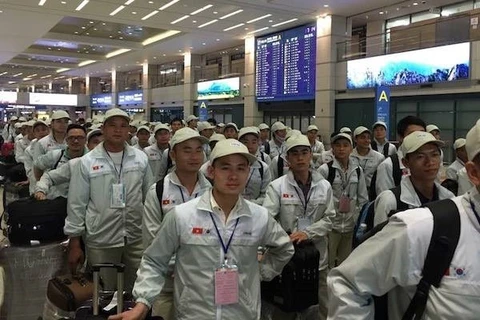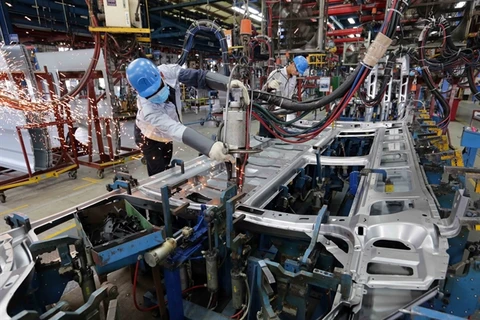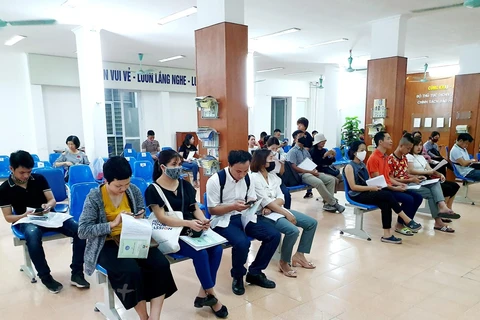 It is necessary to combine technology and workforce to ensure the success of the national digital transformation (Photo: VietnamPlus)
It is necessary to combine technology and workforce to ensure the success of the national digital transformation (Photo: VietnamPlus) Hanoi (VNA) – Businesses will have no other choices than making reforms to become smart enterprises, and employees themselves will also have to adapt to this trend.
A report on labour market trends in 20 economies presented at the 2019 World Economic Forum predicted that over 42 percent of all jobs will change substantially by 2022, with requirements for new skills like analytical skills, design mindset and such soft skills as dealing with complicated issues.
Le Tu Cam Ly, director for public relations, communication and sustainable development at Coca-Cola Indochina, said businesses will have no other choices than reforming their apparatus and operations to become smart enterprises.
To prepare for these strong shifts, workers should equip themselves with adaptability and learning readiness. Besides, they also need to improve their technological and digital skills, according to her.
Country General Manager of IBM Vietnam Tan Jee Toon pointed out the necessity to combine technology and workforce to ensure the success of the national digital transformation.
One of the main barriers to digital transformation in Vietnam is workers’ lack of in-depth professional capacity and new skills to grasp technological requirements in the workplaces where machines and human can work together, he said.
To solve that issue, Tan Jee Toon held that partners in the public and private sectors need to work together to provide students with learning opportunities and skills and better their skills like critical thinking, problem solving skills, communication skills and cooperative skills so as to be capable of competing in a digital economy.
The presence of private firms will promote the new workforce’s learning associated with practicing, he said, noting that in the new context, new job requirements are increasing, especially in such areas as cloud computing, cyber security and digital design.
Echoing the view, Thieu Phuong Nam, CEO of Qualcomm Vietnam, Laos and Cambodia, recommended that aside from specialised knowledge, young people should equip themselves with and perfect soft skills like foreign language skills, skills of working in a multinational and multicultural environment, along with teamwork and self-learning skills.
Companies also have internal training courses, so young employees can gradually gain experience, he said.
The local labour market has long faced a paradox of many trained labourers being unable to find suitable jobs while businesses dealt with a labour shortage, as graduates often had to be retrained to be competent.
Vietnam is also one of the countries most affected by the Fourth Industrial Revolution (Industry 4.0), with many jobs set to become obsolete and many other new ones to appear.
Facing the trend of automation, Vietnamese workers must be trained to meet job requirements in this new situation.
According to Tran Tuan Anh, former deputy director of Ho Chi Minh City’s Human Resource Forecast and Labour Market Information Centre, businesses' demand for workers of all types will increase by 14.5 percent by 2025.
The demand for average-skilled jobs will generally rise at the fastest rate of about 28 percent while skilled workers will be at 13 percent, he told online newspaper baotintuc.vn.
According to human resource experts, skilled and high-qualified human resources have not yet met labour market demand.
Many graduates were not well equipped with expertise, soft skills and foreign languages so they could not find jobs.
“In order to overcome the situation, training cooperation among education institutions and businesses should be enhanced to supply high-qualified human resource meeting businesses’ requirement as well as increase the prestige of educational institutions,” said Nguyen Hoan Hao, a lecture of HCM City’s Pedagogical University.
Businesses will decide how many qualified and capable employees they need every year while schools will be responsible for training students to the firms' requirements, said Hao.
“After graduating, the students often looked for jobs from business recruitment ads, career fairs or job promotion centres,” said Dr Dinh Cong Khai, a lecturer of HCM City’s Economics University.
“Knowledge and skills are important requirements to recruiters,” Khai said, adding lack of soft skills such as communication, time management and teamwork were reasons that made graduates fail to find jobs.
Cao Van Duong, an employee of KPMG Ltd Co Vietnam, said to meet the demands of the labour market, graduates must be strong in their expertise.
“Technology could change rapidly but basic knowledge of a professional is a solid foundation for employees to quickly grasp new knowledge in their working environment,” Duong said.
Additionally, recruiters now focused on soft skills such as communication skills, time management, teamwork, crisis management and personal life balance, he added./.
























